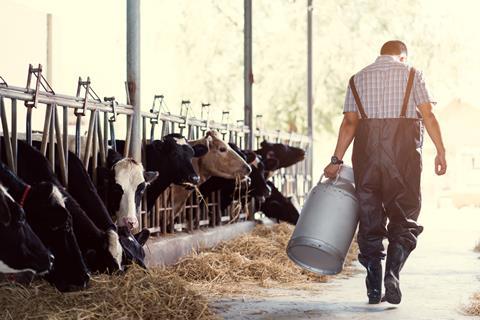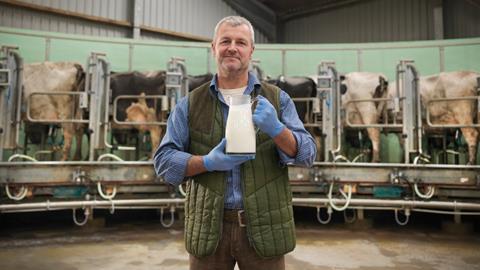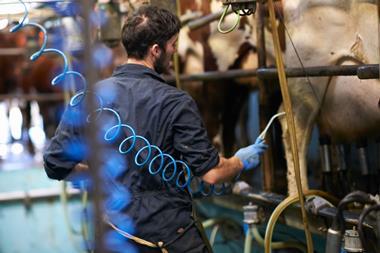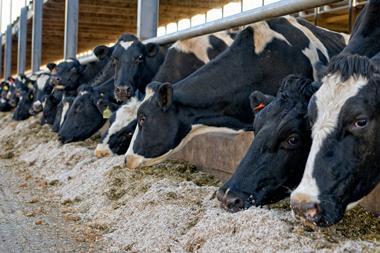New rules and the creation of an Agricultural Supply Chain Adjudicator are set to shake up producer-processor relationships
After more than a decade of campaigning and countless pricing disputes, new legislation paving the way for radical reform in how dairy farmers are paid for their milk was finally laid before parliament last week.
A statutory instrument called the Fair Dealing Obligations (Milk) Regulations 2024 supersedes a voluntary code of practice, introduced in 2012, which has long been dismissed as ineffective.
Included in the regulations is a new Agricultural Supply Chain Adjudicator “with teeth”, according to outgoing NFU dairy board chair Michael Oakes.
So just how will regulated dairy contracts work, how will the new adjudicator operate, and what are the wider implications for farming and food?
The new rules follow an industry-wide review by the Groceries Code Adjudicator in 2018 that revealed an “uneven” distribution of power in the dairy sector. That was followed by a consultation by Defra and the devolved administrations in 2020, which made similar conclusions.
The dynamic was “causing instability for dairy farmers”, for example, by allowing milk buyers to “set and modify the terms of a contract at short notice”, Defra said in 2021. The imbalance of power was played out in a series of cases during the pandemic, seeing farmers forced to pour milk away due to short-notice price cuts and delayed payments.

The new regulations include mechanisms to introduce greater transparency when it comes to pricing, while giving farmers the power to challenge prices if they feel the correct process has not been followed, the NFU says. Processors will also have to respect a mandatory 21-day cooling off period during which farmers can terminate contracts.
The legislation additionally contains provision for maximum notice periods, with a processor having to give a farmer 12 months’ notice to terminate a contract. Farmers will be able to terminate more swiftly in certain circumstances, for example if a buyer misses payments.
At a glance: What’s in the new legislation
Price – The regulations will not directly legislate what prices should be and will not introduce minimum prices. However, they do improve transparency on price for the farmer. If a milk contract contains a variable price, for example, there are mechanisms in place to ensure it can only move in reference to agreed factors. Farmers can also challenge prices they feel have not followed the correct process.
Cooling off periods – Contracts must include a 21-day cooling off period, during which farmers can terminate their contracts without notice with no penalty or liability.
Notice periods – A processor must give a farmer a minimum of 12 months’ notice to terminate the contract. A farmer has the right to a maximum of 12 months’ notice if they wish to terminate their contract. The regulations also allow farmers to terminate more swiftly in certain circumstances, such as when a milk buyer misses payments for milk or is insolvent.
Variation – All variations to the contract must be agreed by both parties. It means milk buyers cannot enforce changes without the permission of the farmer or their representative organisation.
Exclusivity – exclusive contracts (where a farmer must send every single litre they produce to a processor) will be prohibited where the milk contract is for a fixed volume; it will also not be possible to have tiered pricing in an exclusive contract.
Farmer representation – The regulations allow farmer owned structures such as co-ops and producer organisations to have greater flexibility in terms of the contracts they are able to negotiate.
Source: NFU
Any alterations to a contract will have to be agreed by both parties, meaning milk buyers will be unable to make changes unilaterally.
But perhaps the most important development is the creation of the new adjudicator.
Answering long-standing calls for an equivalent to the Groceries Code Adjudicator to regulate the often murky relationship between producers and processors, the new adjudicator will have the ability to impose significant fines of up to 1% of a company’s turnover for regulatory breaches.

Protection for producers
The post is already advertised by Defra through recruiter Gatenby Sanderson.
The salary ranges from £75,000 to £117,800 – the equivalent level to a deputy director role at Defra, according to one industry source – for “an exciting opportunity to set up and lead a new office aimed at improving supply chain transparency and fairness in the UK dairy industry”.
Defra is looking for a figurehead, seemingly one with a strong legal background, with a track record of “reaching evidence-based conclusions and determinations on regulatory and legal issues”, according to the job advert.
It adds the role works within a regulatory model which will ultimately be rolled out across other farming-based food sectors, many of which are either subject to current supply chain fairness reviews (such as horticulture and eggs), planned reviews (such as poultrymeat) or completed investigations (such as pork).
With growing concerns around the prevalance of so-called middlemen in sectors such as horticulture and their use to circumvent the scope of the Groceries Code Adjudicator, the introduction of a new Agricultural Supply Chain Adjudicator could significantly increase transparency between buyers and primary producers, suggests the NFU’s Oakes.
“Some of these middle companies are being created to find away around the GSCOP rules so this new mechanism could be [expanded into other categories],” he told The Grocer at the NFU conference in Birmingham.
What do processors think?
Milk processors had initially expressed resistance to the idea of regulated dairy contracts, with the likes of Müller and industry body Dairy UK cautioning against the negative impact compulsory contracts could have on the sector’s flexibility to react to commodity price volatility.
But with the regulations now making its way through parliament, Dairy UK CEO Judith Bryans says the legislation is an improvement on previous drafts and “certainly workable” for processors.
“We’ve worked a lot with Defra and believe the final statutory instrument has enough balance to work for noth farmers and processors,” Bryans adds.
“The guidance to accompany the regulation hasn’t been published yet but will be crucial in helping companies and farmers understand how the various clauses in the legislation will be interpreted by the regulator. For us, it’s important that the guidance is considered and comprehensive but also that it’s published as soon as possible.”
Read more:
-
Dairy industry rejects calls for cheese salt reduction
-
New dairy regulations and farmer protection could be adopted by other categories: NFU
-
Environmental campaigners to take government to court over Australia trade deal
The new legislation will now pass through both houses of parliament. Once that process is complete, it will come into force after a further 12 weeks for all new and renegotiated contracts.
Defra says there will then be a 12-month implementation period before existing contracts must be made compliant.
“This is to allow industry time to adjust,” it says. “We’re aware businesses may need to amend contracts or adopt new structures and we wanted to allow adequate time for this.”
The NFU’s Oakes says the new rules “will not solve all the problems we face as an industry, nor will it fix prices”. But it will help ensure producers are treated fairly, “that contracts are transparent, and a contract signed cannot be altered without agreement”, he adds.
“For a long time, unfair milk contracts have held back many UK dairy businesses, and these changes will help give dairy farmers much needed business security and confidence,” he adds.
“While progress has taken far longer than any of us hoped and expected, I am confident that we are finally on the right path to building a stronger, more resilient future for the UK dairy sector.”

























1 Readers' comment